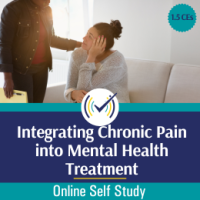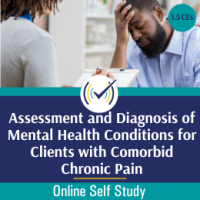Chronic pain isn’t just a medical condition—it’s a lived, daily experience that reshapes how clients think, move, and hope. When it enters the therapy room, it doesn’t simply add another diagnosis—it rewrites the emotional landscape.
For millions of clients, pain has outlasted the injury, and for many clinicians, it’s a mystery that defies traditional treatment models. How do you help someone whose nervous system is signaling danger when no damage remains?
This course translates the science of pain into a clear, compassionate, brain-based approach for behavioral health professionals. It helps clinicians work confidently with clients experiencing chronic pain—without stepping outside their scope of practice.
Dr. Corey Petersen, PhD, LCMFT, brings a rare blend of neuroscience literacy, clinical precision, and communication expertise to this vital topic. With advanced degrees in communication and marriage & family therapy, and research focused on psychotherapeutic language and ethics, Dr. Petersen makes complex neurobiological and psychological processes understandable and applicable in everyday practice.
Through evidence-informed instruction and real client examples, Dr. Petersen walks participants through the brain’s predictive coding system, the pain–fear cycle, and the difference between structural and neuroplastic pain. You’ll learn how to recognize central sensitization, teach clients somatic tracking, and use language that calms rather than amplifies pain signals. Her teaching style is both rigorous and humane—rich with case applications, step-by-step demonstrations, and integrative methods drawn from CBT, ACT, and Pain Reprocessing Therapy (PRT).
Participants will learn to address the emotional, cognitive, and physiological aspects of pain; integrate psychoeducation and mindfulness-based interventions; and collaborate effectively with medical professionals while staying grounded in ethical, scope-aligned care.
Key Takeaways:
Understand how the brain and body create and maintain chronic pain—and how to explain it clearly to clients.
Apply practical interventions from CBT, ACT, and PRT to help clients reprocess pain and re-engage in meaningful activities.
Use trauma-informed, neurodiversity-aware strategies that respect clients’ experiences while promoting resilience and recovery.
Why this course?
Evidence-based and immediately applicable—translating pain science into therapy tools you can use tomorrow.
Clinician-focused—built for behavioral health professionals seeking confidence in treating pain-related distress.
Compassionate and scope-sensitive—empowering you to support change without overstepping medical boundaries.
Learning Objectives:
Identify common causes and contributing factors of chronic pain.
Explain how the brain and body interact to create and sustain pain.
Differentiate between structural and neuroplastic (neural circuit) pain.
Describe how CBT, ACT, and PRT conceptualize and approach chronic pain.
Apply somatic tracking techniques to help clients manage and reframe their experience of chronic pain.
Pain may begin in the body—but its resolution starts in the brain.
Enroll today to help clients reclaim movement, meaning, and hope—using science, empathy, and therapeutic skill.
This is a non-interactive, self-study course. It consists of 6 hours of video instruction and a post-test for CE credit.
Availability: From the time of registration, you have six months to access the coursework.
Who Should Attend: This course is intended for clinicians who provide behavioral health services.
Teaching Methods: This is a non-interactive, self-study course. Teaching methods for this course include recorded lectures, videos, a post-test, and a course evaluation.
How to Attend: Instructions for attending and completing a course can be found here.
![Corey Petersen Headshot]()
Corey Petersen, MA, MS, Ph.D, LCMFT
Dr. Corey Petersen is a communication specialist and the owner of Communication and Connection Therapy. She completed her Ph.D. in Communication Studies at the University of Kansas, where her research focused on psychotherapeutic language and communication ethics. Prior to her Ph.D., Dr. Petersen earned a Master’s degree in Marriage and Family Studies and Professional Communication. She has over 9 years of collegiate communication and psychology teaching experience and is currently a continuing education and corporate trainer. When not teaching, Dr. Petersen can be found working and meeting with clients in her private practice.
Disclosure Statement: The instructor(s) for this course receive compensation for their services. There are no reported conflicts of interest to disclose.
Credit Hours: This course consists of 6 continuing education hours of credit.
Counselors:
![NBCC ce Logo]()
Telehealth Certification Institute, LLC has been approved by NBCC as an Approved Continuing Education Provider, ACEP No, 6693. Programs that do not qualify for NBCC credit are clearly identified. Telehealth Certification Institute, LLC is solely responsible for all aspects of the programs.
Telehealth Certification Institute, LLC is recognized by the New York State Education Department's State Board for Mental Health Practitioners as an approved provider of continuing education for Licensed Mental Health Counselors. #MHC-0048.
Marriage and Family Therapists: Many MFT licensing boards accept our courses or one of the approvals which we have from professional associations. You can check with your board to determine if your licensing board would accept this course.
Telehealth Certification Institute, LLC is recognized by the New York State Education Department's State Board for Mental Health Practitioners as an approved provider of continuing education for licensed marriage and family therapists #MFT-0135.
Social Workers:
![ACE ce Logo]()
Telehealth Certification Institute LLC, #1609, is approved as an ACE provider to offer social work continuing education by the Association of Social Work Boards (ASWB) Approved Continuing Education (ACE) program. Regulatory boards are the final authority on courses accepted for continuing education credit. ACE provider approval period: 05/02/2024 – 05/02/2027. Social workers completing this course receive 6 clinical continuing education credits.
Telehealth Certification Institute, LLC is recognized by the New York State Education Department's State Board for Social Work as an approved provider of continuing education for Licensed Social Workers #SW-0435.
Addiction Professionals:
![NAADAC CE Logo]()
This course has been approved by Telehealth Certification Institute LLC, as a NAADAC Approved Education Provider, for educational credits, effective 10/15/2025. NAADAC Provider #193104, Telehealth Certification Institute LLC is responsible for all aspects of the programming.
Psychologists:
![APA CE Logo]()
Telehealth Certification Institute LLC is approved by the American Psychological Association to sponsor continuing education for psychologists. Telehealth Certification Institute LLC maintains responsibility for this program and its content.
Telehealth Certification Institute, LLC is recognized by the New York State Education Department’s State Board for Psychology as an approved provider of continuing education for Licensed Psychologists #PSY-0128.
Art Therapists: Telehealth Certification Institute, LLC is recognized by the New York State Education Department's State Board for Mental Health Practitioners as an approved provider of continuing education for Licensed Creative Arts Therapists #CAT-0093.
Other Professionals: This course qualifies for 360 minutes of instructional content as required by many national, state and local licensing boards and professional organizations. Retain your certificate of completion and contact your board or organization for specific filing requirements.
This course is a non-interactive, online self-study.
Participants may request a printed version of their certificate of completion to be delivered by mail. A shipping/handling fee of $6.95 will be charged per request. Shipping internationally may require an additional charge.
Closed captioning is offered for all live webinar participants.
You can click on the following links to view our policies:



